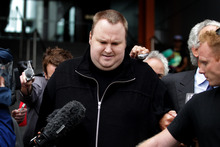Jimmy Wales created Wikipedia. Now he's created a petition to stop the U.K. from sending a 24-year-old Internet entrepreneur to the US to be prosecuted for linking to TV shows on his website.
Two years ago, Richard O'Dwyer was in his second year of college in the U.K. In his spare time he ran a website that acted as a search engine for users to find links to watch TV and movies online.
He respected the rules -- deleting content when he received requests to remove it. But despite this, he’s now been accused of copyright violation and could face 10 years in a U.S. prison, after the British Home Secretary, Theresa May, signed an extradition order in March.
Richard is not a U.S. citizen, he's lived in the U.K. all his life, his site was not hosted there, and most of his users were not from the U.S. The U.S. is trying to prosecute a U.K. citizen for an alleged crime which took place on U.K. soil.
Given the thin case against him, it is an outrage that he is being extradited to the U.S. to face charges. That's why I've just launched a petition on Change.org to stop his extradition -- and why I hope you will sign it today. Click here to sign the petition.
When I met Richard, he struck me as a clean-cut, geeky kid. Still a student, he reminds me of many great entrepreneurs and the kind of person I can imagine launching the next Wikipedia or YouTube.
Copyright matters but from the beginning of the internet, we have seen a struggle between the interests of the "content industry" and the general public.
Richard is the human face of that battle, and if he's extradited and convicted, he will bear the very real human cost.
The internet as a whole must not tolerate censorship as a response to mere allegations of copyright infringement. As citizens we must stand up for our rights online.
Together, the public won the battle against SOPA and PIPA. We proved that when we work together we can protect freedom on the internet. Together, I know we can win this battle too.
Join me and sign my petition to stop the extradition of UK citizen Richard O'Dwyer.
Thanks,
- Jimmy Wales, Wikipedia Founder (Link below)
This story has so many similarities to the Kim Dotcom controversy in New New Zealand. Mr Dotcom has to face an extradition order hearing in August. Like Richard O'Dwyer, Mr Dotcom is not an American citizen and does not have an American based website. Just in recent days the New Zealand High court has come out in favour of Kim Dotcom - declaring the charges against him invalid and the police raid and confiscation of his property illegal. One would get the impression that the United States thinks it owns the internet - they don't, it is a global source of information. It is important that the global community sends a message to the United States. Their censorship of the internet must be stopped.
Peter Petterson
Wellington
New Zealand
In National
In Motoring
In Travel
In World
In Sport
In Opinion
In Technology
In Video
In Entertainment
In Business
In Life & Style
